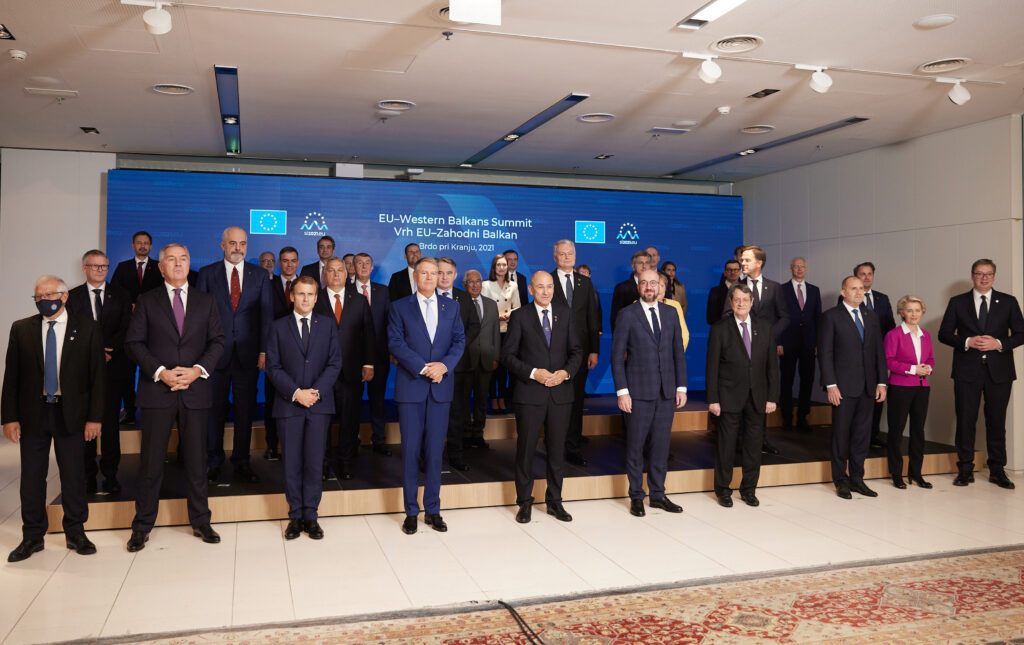
European leaders have reconfirmed the EU’s commitment to include the Western Balkans in future enlargements of the union, stressing the “unequivocal support for the European perspective” of the region as the strategic choice for both sides.
A declaration released on Wednesday during the EU-Western Balkans summit in Slovenia stressed that enlargement will be strictly based upon credible reforms by each country. No timeline was given to the hopeful states.
Albania, Bosnia and Herzegovina, Kosovo, Montenegro, North Macedonia and Serbia all want to join the European Union soon, although how much each country has progressed in their reforms varies.
North Macedonia’s opportunity to start accession talks has been blocked by Bulgaria over history and identity issues. Albania has also remained a victim of the Bulgarian veto, as its EU path is linked to that of North Macedonia.
Bulgaria Could Lift North Macedonia Veto by November Pending Three Conditions
Kosovo’s path is dependent, among other things, on the settling of disputes with Serbia. The latter has advanced relatively more in EU reforms, but it cannot join the union before a final agreement with Kosovo.
Montenegro is the most advanced in the region regarding EU reforms, but corruption, organized crime and economy remain problematic.
Bosnia and Herzegovina suffers from political instability due to its political system demanding the three main political entities – composed of Bosniaks, Croats and Serbs – to agree on all relevant issues. Meanwhile, Serb leaders in Bosnia want the country’s dissolution, and their entity to join Serbia.
Challenges for regional countries remain the same: European leaders highlighted reforms on strengthening democracy, rule of law, fight against corruption and organized crime, good governance, human rights as necessary for progress towards the EU.
Although no timeline was given on the region’s integration into the EU, the reaffirmation of the Western Balkans’ future within the union and the commitment by the latter to enlarge may have brought a sigh of relief to regional leaders.
European Union member states reportedly debated extensively whether to include these confirmations in the joint declaration before the summit.
The EU called on country leaders to refrain from criticizing the European Union in public on unfounded claims.
“The EU is by far the region’s closest partner, main investor and principal donor. The unprecedented scale and range of this support must be fully recognised and conveyed by the partners in their public debate and communication.”
More than EUR 3,3 billion in health and socio-economic support were provided to the Western Balkans since the start of the pandemic only, in addition to 2,9 million vaccine doses.
The warning comes after Serbia’s President Aleksandar Vucic has publicly slammed the EU on multiple occasions regarding its alleged lack of help, while at the same praising China and Russia for assisting Serbia in times of need.
The joint declaration reiterated that financial support by the European Union will continue to be linked to progress on the rule of law and socio-economic reforms, as well as to partners’ adherence to European values, rules, and standards.
Prime Minister Albin Kurti of Kosovo had called on the EU earlier to strengthen its requirements for adherence to European values before it allocates financial support to countries in the region.
The summit leaders also called for “concrete progress” in the Kosovo-Serbia dialogue which has been facilitated by the EU since 2011 with little results.
Albanian PM Casts Doubt on EU Promises Ahead of Western Balkans Summit
With regard to strengthening the region’s economy, EU leaders highlighted the Economic and Investment Plan put forward by the EU, which mobilizes some EUR 30 billion for the Western Balkans over the next seven years – EUR 9 billion in grant funding and EUR 20 billion in investments.
In order to boost their economies through these available funds, they also urged the regional countries to deliver on their last year commitment on establishing the Common Regional Market (CRM) under the Berlin Process.
The CRM is seen as key to enhancing the market integration of the Western Balkans with the EU Single Market.
This year’s summit came amidst growing frustration among the Western Balkan countries over what is seen as a stalling of the EU integration process. France and the Netherlands have been the most vocal in slowing down the pace of enlargement and focusing on reform within the EU.

